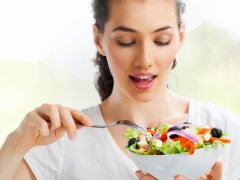Eating a pregnant woman in the first trimester
The schedule and the diet of the future mother at the very early stage of carrying the baby is very important. To ensure that the stomach enters, a pregnant woman needs from the very first days after conceiving a child.
The importance of making the right diet
It often happens that a woman does not immediately find out about her pregnancy. As a rule, quite often this happens only at 4-6 obstetric weeks of pregnancy. A woman is alarmed by the absence of menstruation and the appearance of non-specific symptoms in her, which motivates her to turn to an obstetrician-gynecologist at the very beginning of the first trimester.
When a pregnancy is detected, the doctor must make a set of recommendations for the future mother. An important component is the preparation of a proper and balanced diet. power supply.
It is important to note that each trimester of pregnancy has its own characteristics. The importance of making a healthy diet for a pregnant woman in the first trimester cannot be overestimated. The initial weeks of prenatal development of a baby are characterized by its intensive growth and development. It is at this time that the laying and formation of all the vital organs of the little man takes place.
Competent doctor necessarily makes individual recommendations for each specific patient. The preparation of the diet of the future mother requires a careful and comprehensive approach, which necessarily takes into account the individual characteristics of the woman, the type of her constitution, and the presence of concomitant diseases.
So, the future mother, who suffers from diabetes, cannot use the same products as a healthy woman who does not have problems with persistent hypeglycemia (increased blood sugar levels).
Diet
The first and rather important component is the schedule of meals. In the first weeks of pregnancy, the expectant mother should observe it strictly. Regular intake of vital nutrients ensure the physiological functioning of the body, and are also necessary for proper fetal development.
To eat in the early stages of the future mother should be no less than every 2.5-3 hours. This food is called fractional. At the same time, the entire daily ration is “broken up” into practically equal parts by volume.
With a fractional diet, the main thing is not to overeat. Many future mothers in the early stages of pregnancy make a huge mistake - they start eating for two. This myth has existed for many decades, almost every pregnant woman can hear such a “recommendation” from her mother or grandmother. You can listen to her in order not to offend your beloved relatives, but in no case should she embody her in life.
Currently, dietology has advanced significantly. Numerous scientific experiments have proven that eating “for two” during pregnancy is an absolutely pointless undertaking.
Observance of clear recommendations of proper and balanced nutrition during pregnancy allows women to maintain both their health and their babies.
Main components of nutrition
A proper diet must include the main nutritional components: proteins, fats and carbohydrates. The recommendations of doctors from different countries reflect the different daily requirements for these substances. Every year they are revised, they are adjusted and modified based on data from research conducted.
Squirrels
The daily need for future mom's proteins first trimester of pregnancy is approximately 1.5 grams per kilogram of weight. Thus, an average woman weighing 60 kilograms should consume about 90 grams of protein per day.
In the results of some foreign studies there is evidence that a pregnant woman at this stage should even consume 2 grams of protein per kilogram. Making recommendations should always be individual.
The calculation of the need for protein food for each woman is carried out by the doctor, knowing the particular history and clinical examination data. For example, the expectant mother suffering from chronic kidney disease, accompanied by the development of chronic renal failure, there are many protein products should not be. This may contribute to the progression of this disease in her and lead to adverse consequences for the fetus.
Healthy nutritionists recommend equal distribution between animal and vegetable proteins - 50/50. Only a small change in this proportion is allowed.
Legumes are excellent sources of vegetable protein. Including side dishes or soups made from them in your menu helps to provide the body with a high-quality source of protein. Women suffering from chronic inflammatory bowel disease should be careful. Legumes can cause gas formation.
Also, plant protein is also found in cereal products. About this many future mothers do not even realize. Eating oatmeal or buckwheat for breakfast will also provide the body with a portion of vegetable protein. To improve the taste, you can add some fruit to this porridge or eat it with a boiled chicken. This breakfast will not only be tasty, but also useful.
Another source of protein is animal products, which include fish, seafood, eggs, meat and poultry. The chemical composition of each of these products is unique, they contain certain essential amino acids necessary for optimal functioning of the whole organism.
In the use of protein products of animal origin should observe a number of rules.
- Eat them better with a variety of vegetables. In vegetables there is fiber fiber, which improves the digestive process. It is also necessary for the growth of beneficial microbes that normally live in a healthy intestine.
- Protein products should be alternated. No need to eat only one chicken cooked in various ways. It is better that every day on the table was attended by various dishes prepared from different protein products of animal origin.
- The culinary method is important. Frying in oil or deep-frying - the wrong choice of cooking for the expectant mother. It is better to bake, stew, boil or steam. In this case, you can reduce the amount of unnecessary and even dangerous fats, which are formed during frying of meat or chicken in deep fat.
Another source of protein that is also worth mentioning is dairy products. Fermented milk products are an excellent source of protein, as well as very important lacto-and bifidobacteria. These useful microbes are necessary for the future mom's tummy to work "like a clock."
It is especially important to include dairy products to expectant mothers who suffer from constipation.
Regular consumption of sour milk and coarse fiber contained in fruits and vegetables, will help the pregnant woman to establish the regularity of the chair without additional intake of laxatives.
The choice of dairy products for the future mother should be very careful. Use the following tips when planning your grocery list.
- Focus on your own taste. You can eat almost any dairy products. Women who are overweight should not choose foods that are too high in fat. So, cottage cheese will be a better choice than cheese with 40-50% fat.
- When choosing should pay attention to the date of manufacture and shelf life. Choose products that have a shorter shelf life. Yogurts that can be stored for several months or even a year contain too much preservatives. Such chemicals will not bring health to either the expectant mother or her baby.
- Pay attention to the integrity of the packaging. Paper bags of kefir or ryazhenka should not be swollen or severely deformed.
- Prefer products that do not have in their composition of chemical dyes and additives. The abundance of such substances in yogurt can trigger the development of allergic reactions. The best choice - kefir or bifidok without flavorings. If you want to pamper yourself with strawberry or peach yogurt, then it is better to choose more natural products, where only natural ingredients are added. The best yogurts are those prepared at home.
About carbohydrates
An equally important component of a balanced diet is carbohydrate-containing foods. For the active development of the baby requires a sufficient amount of energy, and its main source is carbohydrates.
There are two types of carbohydrates: “fast” and “slow”. The differences in their effects on the body are presented in the following table.
Carbohydrate | Action taken |
"Fast" | Rapidly absorbed into the bloodstream, leading to a rapid rise in blood sugar levels. Begin to be absorbed into the blood already in the oral cavity. They provoke strong and fast insulin secretion. With long-term intake in the body can contribute to the development of gestational diabetes and obesity. |
"Slow" | Have a complex chemical composition. Energy from them is released slowly, contributing to a relatively long-lasting preservation of saturation. Do not contribute to sharp jumps in blood sugar. |
In the diet of the future mother should be both types of carbohydrates. At the same time, it is the “slow” carbohydrates that give more importance. They are mainly found in various cereals. Boiled buckwheat, rice, oatmeal, bulgur and other cereal side dishes will be an excellent inclusion in the daily diet.
As sweets it is better to give preference to fruit. They contain "fast" carbohydrates. A small amount of fruits and berries will be an excellent addition to the menu and will provide the body with vitamins and trace elements. It is important to note that they should not be abused anyway.
About fats
Fats are necessary for the full development of the baby, but they must be correct. So, the contained fats in fish and vegetable oils will be much more useful than those contained in mayonnaise and margarine.
Many future mothers are wondering whether it is possible to eat butter during pregnancy. Of course, yes. It contains quite a lot of useful fat-soluble vitamins, which will be useful for both the expectant mother and her baby.
When adding fats to the diet, it is always important to remember their amount.
Experts recommend eating to future mothers about 65-70 grams of fat. ¾ They should be diverted to vegetable oils, which can be refilled salads, as well as add to the side dishes.
How to eat a future mother?
Perhaps this is one of the most important issues for all pregnant women who responsibly approach this unique period of their lives. Remember about proper and balanced diet should be throughout pregnancy. If a woman with the help of a doctor learned how to make a diet in the early stages of pregnancy, in the future this skill will be useful to her in other trimesters.
The main rule that you must follow is to eat only useful and permitted products. About harmful while have to forget.
All the little “sweets” or fast food that women can eat before pregnancy can worsen not only her own health, but also adversely affect the physiological course of the prenatal development of the baby.
In the first weeks of pregnancy, a woman undergoes changes in the work of her digestive system. They are largely due to hormonal changes that occur in the female body. At this time, specific pregnancy hormones appear in the bloodstream, which are necessary for the active growth of the baby.
Such changes often contribute to the fact that the expectant mother begins to feel nausea, decrease or extremely strong increase in appetite, soreness in the stomach, changes in taste habits. Many women have a strong desire to eat any particular product. Most often, they become something that they did not like before pregnancy and often did not use it in everyday life. Some future mothers say that they always want to eat, and they, as a rule, are beginning to actively “be friends” with their fridge.
Nutrition features by week of pregnancy
Each week of pregnancy is characterized by specific changes in the development of the baby. Every day, a tiny baby, which is a few more cells, is undergoing serious biological processes. This is what leads to the fact that the preparation of the diet in each week of pregnancy is extremely important.
In the first weeks of pregnancy
The very beginning of pregnancy usually does not cause any adverse events in the expectant mother. At this time, a small embryo is still very tiny. As it grows and hormone levels increase in the blood, a woman begins to feel certain subjective sensations.
In order to understand how to feed the expectant mother in the first trimester of pregnancy, it is important to understand how the process of organogenesis itself (formation of internal organs and systems) occurs in a baby.
To build all the internal organs requires a sufficient amount of protein. This protein is an important building block. All cells of the human body are built from it.
Inadequate intake of protein in the female diet can lead to the fact that the child will have defects in its intrauterine development. This situation is dangerous development of defects in the structure and functioning of internal organs. They are already identified, as a rule, after the birth of the baby.
Problems with the entry of proteins into the female body often occur in women who are on a vegetarian diet. The exclusion of animal food during pregnancy is a very complex and always debatable topic among patients.
Many women who promote this style of food and actively use it in their lives, categorically do not perceive the use of food of animal origin. Refer all the same to the medical recommendations. Each doctor, regardless of his specialty, will recommend to a future vegetarian mother to include meat, fish, eggs and dairy products in her diet.. It is extremely important to do this in the first weeks of pregnancy, when the formation of the internal organs of the baby occurs.
Doctors emphasize that the expectant mother should think at this time, first of all, not about herself, but about the health of her baby.After his birth, a woman, at her will, can again return to vegetarian food.
If the expectant mother, who uses a vegetarian style of nutrition, flatly refuses to eat animal products, then it is important for her to carefully monitor the composition of her diet. The amount of incoming proteins in her body should be within the recommended values. There should be no deficiency of protein nutrients at this stage of pregnancy.
It is also important to remember the principle of combining products. Each protein product contains essential amino acids. Lack of admission at least one of them already contributes to a change in metabolism and even leads to the development of pathologies.
One example of a competent combination of products is the use of rice and legumes. Such a combination of nutrients in its chemical composition has a good amino acid composition - better than in any mono-diet.
5-7 week
Aversion to a certain type of food is a fairly frequent symptom that can occur in this part of pregnancy. It is also due to the fact that hormonal balance changes in the female body.
It is important to note that if the future mother has no appetite at all for several days, then she should definitely see her doctor.
You should enroll to the therapist: he will assess the general condition of the pregnant woman and be able to identify any associated pathology. If they are not there, then the doctor will simply give recommendations on how to improve and change the diet to reduce the adverse symptoms.
8-10 week
By this time of pregnancy, significant changes have already occurred in the baby’s body. The condition of the future mother has changed. In her blood, the chorionic hormone (hCG) is still growing, contributing to a change in well-being.
Many women note that at this stage of pregnancy they develop severe nausea and even vomiting. Such adverse symptoms usually occur during toxicosis of the first half of pregnancy. The degree of their severity is different and depends on the individual characteristics of each woman.
Toxicosis may also be accompanied by a decrease in appetite and a change in taste habits. Compliance with the drinking regimen helps to cope with adverse symptoms that develop during toxicosis. To do this, a woman should drink at least 1.5 liters of water per day. If she suffers from severe chronic kidney disease or heart failure, then the amount of fluid may be limited.
The best choice is plain water at room temperature. Compotes, fruit drinks and juices can also be consumed, but mostly for variety. Such drinks, as a rule, contain a lot of sugar, and when they are taken in large amounts in the blood, they can cause sudden surges of glucose, which only provokes thirst.
The effects of toxicosis may increase with the use of poor-quality food. Thus, semi-finished products or fast food often provoke increased nausea in pregnant women. A balanced diet in this case will help to cope with unwanted symptoms.
11-13 weeks
This period is the final stage of the first trimester of pregnancy. By this time, the future mother should already know what is useful and what is harmful for her and her baby. During the first 12 weeks of pregnancy, a woman should already learn how to create her own individual daily diet with the obligatory inclusion of all necessary nutrients.
At this stage of pregnancy, the daily caloric intake should be at least 2700 kcal. The results of various studies provide different data on the daily caloric intake, but most of them still indicate this value.
Prohibited Products
In addition to the allowed products, there are those that the expectant mother can not eat.Women who want to lead a healthy lifestyle should not use them throughout the entire period of pregnancy, and not only in the first trimester. The use of these products may harm the body and significantly impair its functioning.
Alcohol
Products that are absolutely contraindicated for all expectant mothers include alcohol. Pregnancy and drinking alcohol are unacceptable notions, under no circumstances should a pregnant woman consume beverages that contain ethyl alcohol. Even on family holidays there should be juice or fruit drink in the glass of the future mother.
Many women make the mistake of thinking that small alcohol drinks in small quantities will not harm their baby. It's a delusion. The strength of the drink does not play a significant role. Even beer or wine can harm an actively developing child, especially in the early stages of its prenatal development.
Alcohol negatively affects the formation and development of nerve cells, the central nervous system and other vital organs in a baby.
Coffee
Expect to drink this drink every day to the expectant mother. You can please yourself with a cup of aromatic espresso or cappuccino, but not every day.
Caffeine contained in coffee has an active effect on the tone of blood vessels. During pregnancy, the baby, who is in the womb, receives all the nutrients through the common blood flow system with his mother. The effects of caffeine on blood vessels can contribute to the deterioration of the blood supply to the fetus.
If a woman cannot live without coffee, then she should choose decaffeinated coffee drink. In this case, the risk of adverse effects will be minimized.
Semi-finished products and fast food
Such products are extremely unfavorable for use during pregnancy: they contain quite a lot of salt, chemical additives, flavor enhancers, preservatives, stabilizers, and there is nothing useful in them.
It is better to replace such products with a useful bird or fish. If the future mother wants fast food, she can prepare alternative dishes at home. So, she can make chicken nuggets. You can cook them from chicken breast fillets or thighs. Shredded croutons baked from grain bread are suitable for breading. Such homemade nuggets will be an excellent alternative to unhealthy fast food.
You can learn more about nutrition during pregnancy from the video below.























































